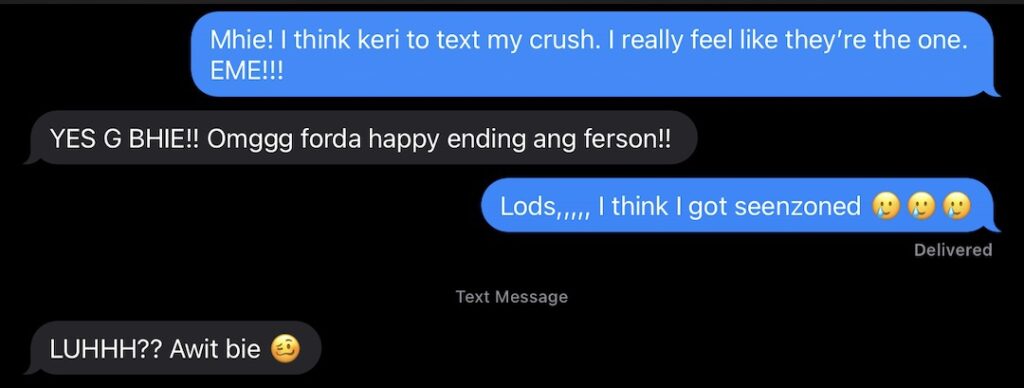
Filipino slang is basically another language—well, almost. Here are some terms used words to get you started.
Much like people, languages change over time. The introduction, evolution, and contexts of words change—which means we always have to keep up.
For Filipinos living abroad or visiting the Philippines, it’s not always enough just to know Filipino. Colloquialisms and slang have become typical in day-to-day conversations, which could make even the simplest of sentences difficult to understand.
Well, that is if you’re not in the know.
Here’s a list of commonly used slang words in Filipino. The list is by no means comprehensive, but here are a few typical ones that you can easily add to your dictionary and pull out when you visit.
Awit
Not to be confused with “awit,” which means song in Filipino, this particular term is a combination of two words: “aw” and “sakit.” It’s usually used as an exclamation or reaction to when something hurts or you feel particularly bad about something.
For example, if your friend broke up with their significant other, you could say “Awit, dude.”
Bhie, bie
Bhie or bie is a term of endearment used to refer to another person. It’s a Filipinization of the word “baby,” and it can be used in friendly or romantic contexts. For example, you can refer to a close co-worker of yours as “bhie” or “bie.” It can also be your pet name for your special someone.
Eme
If you’re familiar with “charot,” the word “eme” is basically the same. It’s an expression usually attached to the end of a sentence to replace “just kidding” or “half kidding.” Like when you’re tired and don’t want to show up to work the next day, you can say “I’m going to file a sick leave tomorrow. Eme!”
Forda _____ ang ferson
“Forda” is an evolution of the English phrase “for the.” The simplest way to explain it is that it’s used to describe what a person is into. For example, a friend of yours could be really into “Drag Race Philippines.” You could say “forda Drag Race ang ferson,” which means they’re a really big “Drag Race” fan. And “ferson” literally just means “person.”
Game/G/Ge
“Game,” “G,” and “Ge” all mean “sure” or “okay.” “Ge” specifically is a shortened version of the Filipino word “sige,” which also means “sure” or “okay.” These terms are usually used to say yes to plans. Like if someone asks you if you want to go out for dinner, you could reply with a simple “game,” “G,” or “ge.”
Keri
“Keri” is an evolution of the word “carry.” In the Filipino context though, it means “I can do it.” So the next time someone asks you if you’re free to help them move their furniture, you can just say “Keri!”
Lodi/Lods
“Lodi” is the scrambled version of the word “idol.” In the Philippines, you usually refer to people you look up to as “idol.” “Lods” is the recently evolved version of the term. It isn’t just reserved for people you admire, though. If you’re close to someone, you can always call them “lodi” or “lods” as a term of endearment.
Luh
“Luh” is the shortened form of the Filipino word “hala,” which is an exclamation used for when something turns out bad. The context it’s used in is usually a reaction to absurd news. Like if you’re at a burger place and they run out of burgers. That’s a very “luh” worthy situation.
Mhie, mie
“Mhie” and “mie” is another term of endearment that usually refers to an older mother figure. It’s not exclusively used to refer to women or older people, though. The gay community and the younger generation specifically use this word to refer to friends no matter what age or gender. (I personally switch between calling my friends bie and mie).
Sanaol
Sanaol is the compressed version of the phrase: “sana all.” This phrase literally translates to “I wish all,” which doesn’t really make much sense. In the Filipino context though, “sanaol” is a common response to someone else having or experiencing something you want.
For example, your friend is going on an all-expenses-paid trip to Japan. The common reaction to that news would be a simple “sanaol.”
The word can also be used in an aspirational sense. Like if you see a sweet couple walking while holding hands down the street, you’d be hard pressed not to say “sanaol!”
Seenzone
If the United States has “left on read,” the Philippines has “seenzone.” The term is an amalgamation of the words “seen” and “friendzone.” If you send a text to someone and all they do is open it and not reply, you’ve been “seenzoned.” For example, you send a risky text to someone you like and they open it, but you’re left without a response.
Sad to say, but you’ve been seenzoned.
Let our response be, “Awit, lodz.”
RELATED STORIES
A Language of Love: How a simple slang led to a deep connection
Language evolves online (and that’s okay)

